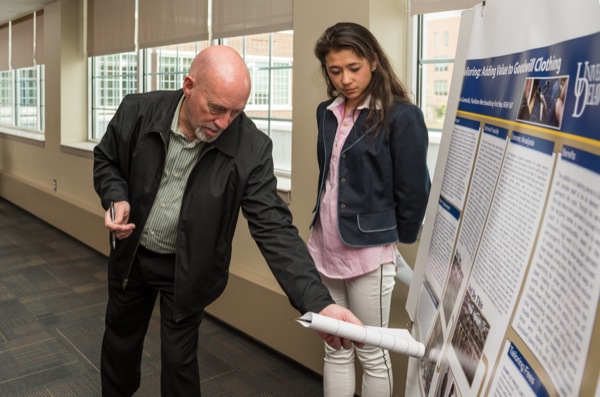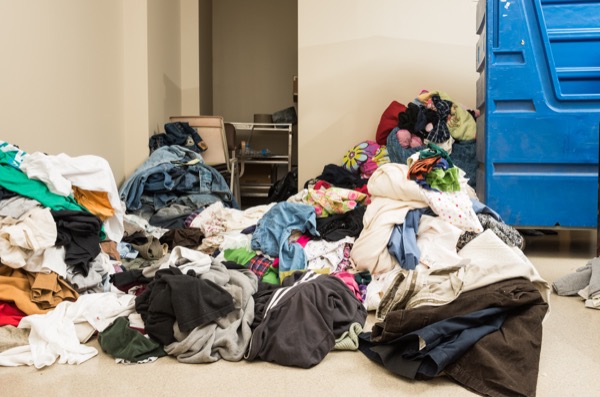


Sustainability at Goodwill
Students develop proposals to help Goodwill reduce waste, create jobs
10:28 a.m., May 6, 2015--Goodwill Industries of Delaware and Delaware County relies on donations of clothing and household items to achieve its primary mission of creating jobs, but not all of those goods find buyers in the nonprofit organization’s retail stores.
In fact, Goodwill’s warehouse near New Castle, Delaware, contains 6-7 million pounds of unsold clothing at any given time — clothing that will end up packed into huge bundles and sold at a low per-pound price to companies that ship the bales overseas. International markets fluctuate widely, and every bulk sale is a financial hit for the organization, which works to improve the lives of people who have barriers to self-sufficiency.
Campus Stories
From graduates, faculty
Doctoral hooding
“We’ve been dealing with this issue for years,” said Ted Sikorski, vice president for marketing and development at Goodwill Industries in Wilmington, Delaware. “The goal for us is to take what we currently have [in the warehouse] and find a way to use it to create jobs. Making money is good, but given a choice, we’d rather create jobs.”
Now, University of Delaware students have been asked to help.
In what Sikorski expects to be an ongoing, interdisciplinary effort, Goodwill has reached out to UD for ideas of creative and sustainable solutions to the problem of what to do with unsold textiles.
The first phase of the partnership occurred this semester, when a class in the Department of Fashion and Apparel Studies came up with some proposals, which they presented to Sikorski and a group of business leaders who are members of the department’s Industry Advisory Board.
“Goodwill was looking for proposals to help them do more with the things they can’t sell, creating more jobs and becoming more sustainable, and we were looking for a real problem for our students to work on,” said Abigail Clarke-Sather, an adjunct faculty member in the Department of Civil and Environmental Engineering and the Department of Fashion and Apparel Studies.
An engineer who specializes in product design, Clarke-Sather turned to fashion and apparel studies students to begin addressing the issue. The class came up with ideas and will later help develop business plans.
“We think this is a way for us to develop a stronger connection with the University,” Sikorski said. “The brain power is here, so we at Goodwill are very excited about this, and we’ve talked to our national organization about it.”
The students looked at the problem from a variety of perspectives.
Erin Murphy, for example, proposed recycling the fabric from unsold clothing into a completely different product — rag rugs. Her plan suggested that the idea could create as many as 1,600 jobs after Goodwill invested in sewing machines and employee training, and her research found that such rugs sell online for between $25 and $300 depending on size.
Another student, Mollie Lewander, designed a training plan for Goodwill retail store employees to give them more information and guidance in identifying items and brands customers might be persuaded to buy.
“I’ve been in contact with business students and with Goodwill,” she said. “Once we were given this problem, we really dove into it.”
Student Maria Gorecki proposed that Goodwill hire and train workers to do alterations so that customers could buy less-than-perfect items and have them tailored to fit at the store. Gorecki did some of her research by sorting through a large bundle of unsold items that Goodwill supplied to the class; she found 70 items that she thought could benefit from tailoring and become more appealing to customers.
A two-student team devised the idea of a mobile app that would educate consumers about the life cycle of pieces of clothing and help showcase items available in specific Goodwill stores.
“We were given a real problem to solve, so we were working with a purpose,” said Lindsay Hynes, who worked on the app proposal. Her teammate, Retura Claar, called it “a great experience and a great class.”
Later this semester, students in the Alfred Lerner College of Business and Economics will present business plans to Goodwill. In the fall, some mechanical engineering students will look at the problem from their perspective.
“I’m hoping this is just the first of many times we work with UD,” Sikorski said. “Here are four groups of students who looked at the same bale of clothes, and they came up with four very different ideas. I’m sure we’ll continue to get more great ideas from other students, too.”
Article by Ann Manser
Photos by Kathy F. Atkinson









